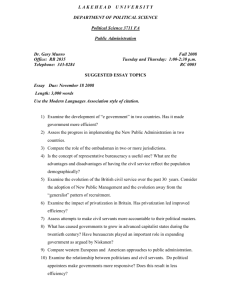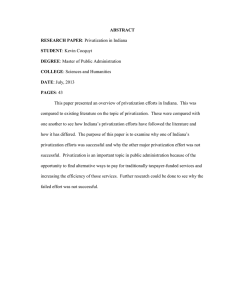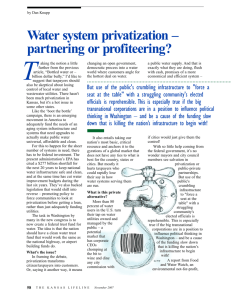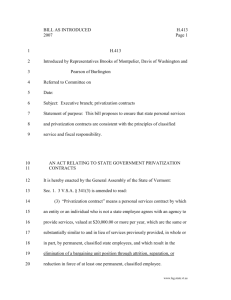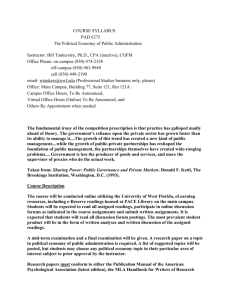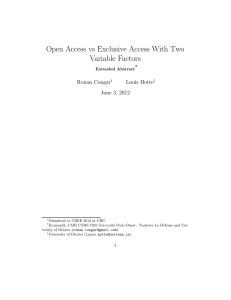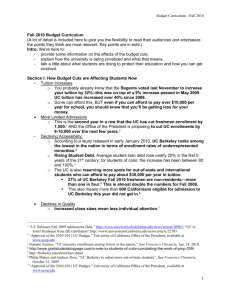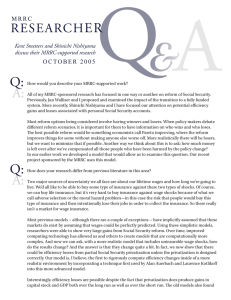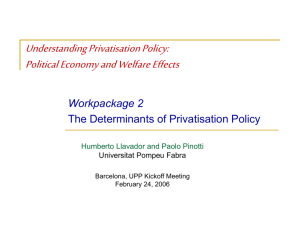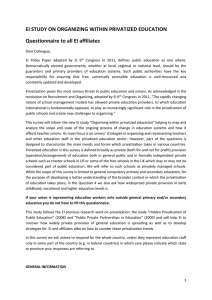Beat Privatization
advertisement
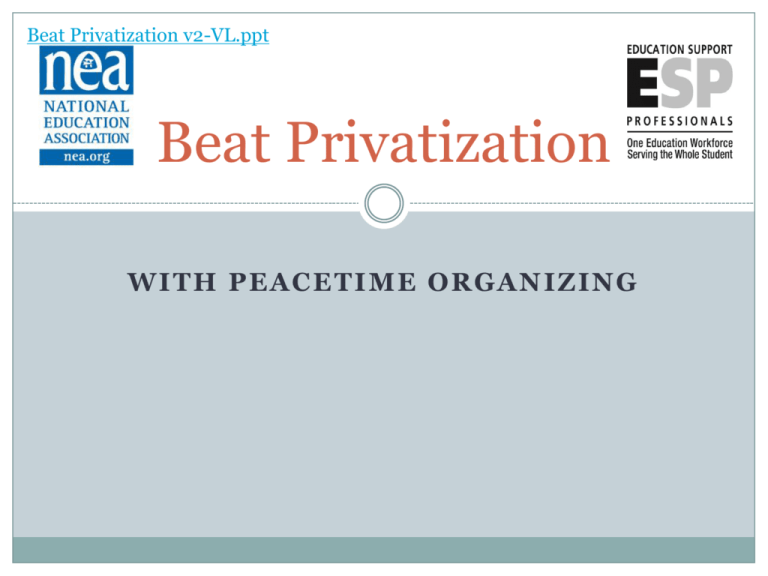
Beat Privatization v2-VL.ppt Beat Privatization WITH PEACETIME ORGANIZING What do we know about privatization? “…privatization refers to the transfer of any government function to the private sector including governmental functions like revenue collection and law enforcement.” -Wikipedia The extent of the threat – K-12 % of U.S. K-12 school districts with some privatization Job Group Percent Job Group Percent Transportation 30% / 31% Custodial 13% / 13% Food Service 25% / 24% Health Services 13% / 13% Security 18% / 17% Paraeducators 12% / 9% Technical Svcs. 18% / 17% Admin./Clerical 9% / 7% Skilled Trades 16% / 14% Source: NEA ESP Member Surveys: 2002 and 2007 The extent of the threat - lately What’s been happening since the deep recession started a few years ago? MEA members who lost jobs to privatization 800 700 600 500 400 300 Members 200 100 0 Source: Michigan Education Association (to date) The extent of the threat – Higher Ed % of Higher Ed institutions that had some privatization Service Percent Service Percent Food service 57% Transportation 17% Skilled trades 29% Security svcs. 16% Technical services 28% Clerical svcs. 16% Custodial services 28% Health & Stud. Svcs. Source: NEA ESP Member Surveys 2007 9% ESP privatization comes in different packages Selected services- ongoing or one-time Management only Total contracting out Some major players Transportation: First Student – subsidiary of First Group, plc (based in Great Britain), $9.52 billion in sales Food service: Sodexo, Inc. – subsidiary of Sodexo (based in France), $19.96 billion in sales Chartwells – subsidiary of Compass Group, plc (based in Great Britain), $21.40 billion in sales Custodial/maintenance: Aramark (based in US), $12.30 billion in sales Beyond our ESP jobs – in schools Other services - health, speech, special education, etc. Vouchers, charter schools Beyond our ESP jobs - Other govt. services Parking (Chicago) Toll roads Prisons - Corrections Corporation of America Why do they do it?- Cost Privateers always say they’re going to save money. Why is this often not true? Why do they do it?- Management issues Reduce management workload, avoid dealing with inhouse problems Why do they do it?- There’s $$ to be made! Huge companies are involved Favoritism/nepotism/ corruption Why do they do it?- To weaken us! The privatization movement is driven by anti- government, anti-union, anti-public employee ideology Why is privatization a bad idea? Our jobs Impact on the quality of education – we are essential parts of one education workforce that is serving the whole child Loss of accountability and control, dependency on the contractors Corruption Cost When do we start to fight privatization? The Privatization Continuum No hint of privatization (prevention) Investigation (studies, proposals) Complete privatization (you’re fired!) When do we get involved? Be proactive – inoculate against the privateers! Call your UniServ Director right away. Don’t wait until they say “We’re going to privatize you!” Peacetime organizing- crafting our message We have power and we can use it We live here We work here We vote here Organize! Using our power – electoral approaches One of the best ways to protect ourselves from privatization is to elect school Board members who understand privatization’s dangers and who will support us. The same is true for state legislators. Using our power – bargaining approaches Depending on your state’s bargaining laws, it may be possible to negotiate prohibitions against contracting out, or protections for employees if jobs are contracted out. It’s a lot easier to bargain good contract language before there’s a privatization threat. Using our power – legislative/regulatory approaches WA and IL have laws requiring privateers to provide comparable benefits - these have been very effective Some states give unions the right to bid on contracts Some other state and municipal approaches: Prohibit corporate criminals from contracting Require substantial savings Require thorough and accurate cost comparisons Require specific conditions, such as an economic impact analysis Living wage requirements Organize! Water Privatization protest, Cochabamba, Bolivia Madison, WI, 2-15-11 Presented by
